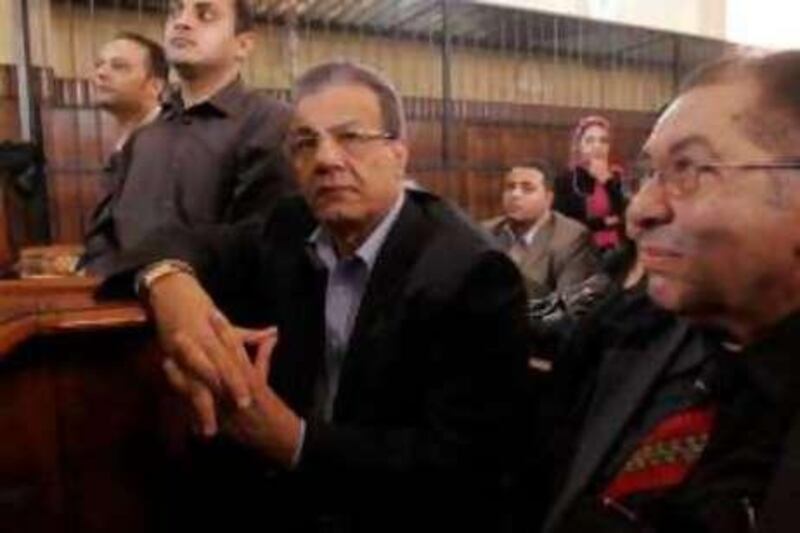CAIRO// Two journalists were each fined 80,000 Egyptian pounds (Dh53,700) yesterday after a court found them guilty of defamation after an unflattering photo of one of the country's most powerful religious leaders was published along with a scathing article. Mohammed Sayed Tantawi, the grand imam of Al Azhar, Islam's highest Sunni institute, sued Adel Hamouda, the editor of the Al Fajr independent newspaper, and Mohammed el Baz, a writer, over the publication of a doctored image showing him wearing a papal robe with a cross hanging at his chest.
The pair also published a critical article demanding Sheikh Tantawi refuse an invitation to visit the Vatican after Pope Benedict made comments that were deemed insulting to Islam. After a trial that lasted for more than nine hours, a criminal court found the pair guilty of insulting Sheikh Tantawi, but found them not guilty of insulting Al Azhar itself. "It's a very high fine, the highest I've ever heard of. I guess I'm a pioneer in everything," Hamouda said, adding "any fine is better than prison, it was such a tough case."
"We are getting the fine now, as we won't be able to leave the court without paying the 160,000 fine at the court." "Long live justice" shouted Hamouda's supporters and journalists at his paper who had gathered in the courtroom since early morning. Judge Mahmoud Samy, head of Giza Criminal court, also ordered Hamouda, 60, and Baz, head of investigative department at the paper, to pay 5,000 pounds to Sheikh Tantawi.
Hamouda lashed out at his accuser in court yesterday. "If [Sheikh Tantawi] is dragging journalists to the court, insisting on jailing them, I wonder what Osama bin Laden would like to do to us. "We didn't seek reconciliation out of apology or of fear of the judiciary, but out of respect for Al Azhar," said Hamouda, surrounded by his lawyers in the courtroom. Sheikh Tantawi, 79, was not at the court yesterday and he had not attended previous trial sessions.
Despite condemnation from journalists and appeals by others, including Makram Mohammed Ahmed, the head of the press syndicate, to drop the case, Sheikh Tantawi refused. Newspapers in the country came out in support of Hamouda. "Egypt's journalism in court" read the headline of the opposition daily Al Destour yesterday. The verdict comes as several other editors appeared in court yesterday and over the past year, sparking a national controversy over press freedom in Egypt.
In Giza province, the Agouza Appeals Court is considering appeals brought by four editors-in-chief against one-year jail sentences imposed after being charged over publishing false news that harmed ruling party figures. The journalists are Hamouda, Ibrahim Eissa, editor of Al Destour, Abdel Halim Qandeel, editor of Sawt el Omma, and Wael el-Abrashi, former Sawt el-Omma editor. The ruling was scheduled for Dec 6.
Another case, the trial of Mr Qandeel and the chairman of the board of directors at his paper, Essam Fahmi, started yesterday after a lawsuit was filed by Ahmed Ezz, a lawmaker from the ruling party. It was adjourned to Nov 6. Eissa was sentenced to two months in prison last month after an appeals court upheld a guilty verdict against him for publishing stories questioning the president's health, which at the time triggered a controversy over press freedom.
Eissa, who was originally sentenced to six months by a lower court in March, was charged with spreading "false information ... damaging the public interest and national stability", and had faced up to three years in prison for the stories, which were published in August last year. In an unexpected move, Hosni Mubarak, the Egyptian president, pardoned Eissa last week, but the laws that allow jailing journalists remain, four years after Mr Mubarak said they would be repealed. "Saturday 11th of October will mark a decisive day for freedom of the press in Egypt, three Egyptian courts will be held to try six independent newspapers editor-in-chief, which clearly indicate, regardless of the verdicts that will be issued, the risks that face freedom of the press in Egypt, specially the independent press," said a statement from The Arabic Network for Human Rights Information (ANHRI).
"The most important case is the one of [Sheikh Tantawi] against Adel Hamouda as it comes on the first anniversary of [Sheikh Tantawi] demanding that journalists accused of publishing false news and spreading rumours to be lashed 80 lashes, and his turning down of reconciliation offer and refusing the newspaper's offer to publish an apology on its front page," added the statement from ANHRI. "This is freedom of the press that [Sheikh Tantawi] is standing against."
nmagd@thenational.ae





